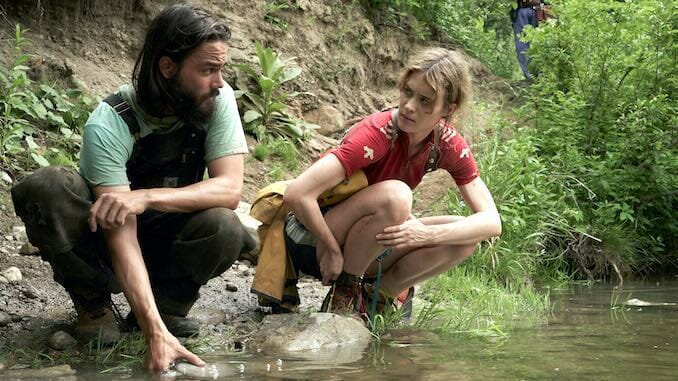Station Eleven Has Pulled Off the Miracle of Grounded Apocalyptic Drama
Photo Courtesy of HBO
There is no way to talk about HBO’s magnificent miniseries Station Eleven without talking about The Leftovers. Beyond the thematic similarities—humanity trying to cope in the aftermath of an unexpected global disaster—the creator, Patrick Somerville, was a writer for The Leftovers, and it’s evident from the start that despite the many distinctions, there is a lineal atmospheric relationship here. You could argue that in order for Station Eleven to exist in its best possible form, The Leftovers had to come first. (And perhaps Lost had to come even before The Leftovers, and so on and so forth back to the first moving image of a train going through a tunnel.)
What distinguishes Station Eleven from its stylistic predecessors, and what makes it better, is how Somerville, his writers, and the ridiculously talented quartet of directors who took the helm in Season 1 have managed to plant their narrative roots firmly in the ground, rejecting the crutch of inexplicable supernaturalism even in a post-apocalyptic world where doing so is a serious challenge. Nor do they go the other way—the way of The Walking Dead—and succumb to the allure of grim horror that must be so tempting in a world bereft of law and order. It’s a narrow line to walk, but Somerville’s team have mastered this particular tight rope in a way that no show of the genre has ever quite managed; the result can be almost unbearably beautiful. And if they have a god, that god is art.
None of this is meant to diminish The Leftovers or Lost, but only to point out that with Station Eleven, we’ve reached the next stage of the genre’s evolution. The apocalypse is very much on our collective minds lately, apocalypse art is especially compelling, and The Leftovers established a new artistic standard over three gorgeous seasons. Yet if you ever overhear a conversation in which one person tries to convince another to watch, or if you’ve been part of such a conversation yourself, inevitably this line comes up:
“You just have to get through the first five episodes.”
It’s true, too. The footing is wobbly at the start, and the motivations of groups like the Guilty Remnant never quite made sense (despite the brilliance of Ann Dowd). It can be ponderous, unclear, and overly pleased with its own mystery, like Lost at its worst. Even after the show hit its stride, there is occasionally an over-reliance on mystic uncertainty when the story gets a bit too hard to justify. A little of this goes a long way, and by the end of the series, The Leftovers had almost mastered the proportions, but in hindsight the missteps tend to stand out, and those missteps have far-reaching effects, like performances by certain cast members that veered into the dual extremes of corniness or inscrutability.
Station Eleven, from the very start, is more sure of itself, and thus less beholden to out-of-the-blue mysticism. Part of that is the phenomenal casting, highlighted by two actors in Mackenzie Davis and Matilda Lawler who play the lead character, Kirsten, at different ages, and are too good for words and should be drowned in awards. Where The Leftovers leaned heavily on Justin Theroux, though, Station Eleven has the luxury of letting the two Kirstens showcase their brilliance against a cast with almost no weak spots. Another is the writing; as these characters navigate a world gutted by a pandemic (it was both good and bad luck for Somerville that the process of adapting his friend Emily St. John Mandel’s novel began before COVID-19), they behave in ways that align with what we expect from human beings under stress. That may sound very basic, so let me put it a different way: it feels true. This is no easy feat for a series of extreme premises that segues from Armageddon to a traveling theater troupe to a children’s crusade to a pregnancy ward with a dozen simultaneous births. For any of this to resonate, to matter, the behavior of the humans inside the machine must feel not just rational, but understandable, perhaps even relatable. In every case, it does.
-

-

-

-

-

-

-

-

-

-

-

-

-

-

-

-

-

-

-

-

-

-

-

-

-

-

-

-

-

-

-

-

-

-

-

-

-

-

-

-








































